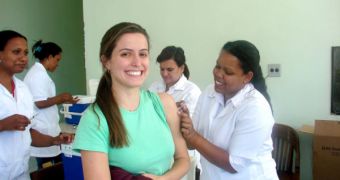In the largest clinical trial aimed at observing the effects of a new, combo vaccine against the Human Immunodeficiency Virus (HIV), results were only moderately successful. Two older vaccines were combined in the current studies, so that scientists could assess their efficiency when working together. But the effort was not a complete failure, scientists say. The new medication, they note, was effective in reducing the number of people who got infected with HIV by more than 30 percent, which was a huge step forward from previous results, Nature News reports.
“I don't think anybody knows why this worked the way it did. It's the largest step forward that's ever occurred in the HIV-vaccine field, but there's a tremendous amount of more work that will need to be done,” immunologist Dan Barouch, who is an expert at the Beth Israel Deaconess Medical Center, in Boston, Massachusetts, says of the results. The new investigation was conducted on more than 16,000 Thailand residents, aged between 18 and 30. All of the participants were HIV-negative at the beginning of the US$119-million study.
The investigation was sponsored by the US Army Surgeon General, and was conducted starting from 2003 by the Thai health ministry. The vaccines used were manufactured by Lyon, France-based Sanofi-Pasteur, and Brisbane, Australia-based VaxGen, respectively. In their separate trials, the drugs had little to no efficiency against the seemingly invulnerable virus, but their combined action appeared to have some effect. The study took place over 24 weeks. The participants were administered four doses of a 'primer' vaccine – containing synthetic versions of three HIV genes –, as well as two doses of a 'booster.' The latter contained one of the major components of HIV's outer coating, the gp120 protein.
Tests to determine if the test subjects developed HIV or not were then conducted every six months for three consecutive years. Imperial College London HIV researcher Adriano Boasso says that, “The numbers of people that became infected [following the study] are really small.” Many scientists were amazed that significant results were recorded. “Up until now, we've all believed that an AIDS vaccine is possible. Sseeing [sic] a signal in humans is a pivotal and important part of the process of getting the product we need,” the President of the International AIDS Vaccine Initiative, Seth Berkley, adds.

 14 DAY TRIAL //
14 DAY TRIAL //